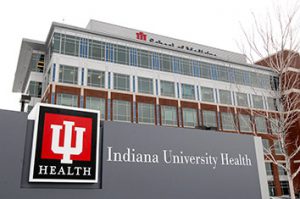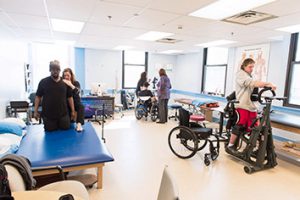
Hospital frugality drives health property shake-up
Instead of building new medical office buildings, cost-conscious Indianapolis-area hospital systems have the past few years opted for space in existing buildings.

Instead of building new medical office buildings, cost-conscious Indianapolis-area hospital systems have the past few years opted for space in existing buildings.
Hospitals and doctors still aren’t seeing a wave of new patients because rising deductibles in patients' health plans are continuing to delay medical procedures, even though their job prospects are better than they’ve been in years.
Nurses in Indiana are underpaid, relative to their peers nationally. They are not overworked from a sheer number of hours, but the demands of hospitals nurses have spiked recently, reducing nurses’ margin for caring for patients with a human touch. For a business that competes on service and, increasingly, on price, those are big problems.

“Shared value” approach directs resources to help people in ways that could build the drugmaker’s business.

The Indianapolis-based health insurer raised pay for its executives, including CEO Joe Swedish, at a much slower pace than the 38-percent return it generated for shareholders last year.

The fired nurse, Lacie Little, was one of two nurses quoted in an IBJ story that broke the news of the attempt to organize a nurse union at IU Health’s downtown hospitals. The union working with the IU Health nurses has filed an unfair labor practices charge.
IU Health had one of its most profitable years ever in 2014, as it cut staff, boosted its physician office visits and improved bill collections. But it is still hoarding cash to be ready for future cuts in reimbursement as well as future building projects.
Think we’re almost done with changes from Obamacare? Think again. Things won’t settle down any sooner than 2017, and they could actually get even wilder after that.

Nurses at Indiana University Health’s downtown hospitals are moving quickly to form a union in a bid they say is designed to improve their own working conditions and pay and to improve care for patients.
The fact that Assembly Biosciences Inc. and AgeneBio now list New York and Baltimore, respectively, as their headquarters cities doesn’t hurt Indiana and could help the state, says David Johnson, CEO of BioCrossroads.
The top five executives at Eli Lilly and Co. took home 5 percent to 10 percent less in cash, stock and perks last year than the year before, according to a Monday securities filing.
Students at charter schools achieved twice as much growth on reading and math tests as similar students at local traditional public schools, according to a new study from Stanford University.
New research shows patients lose trust and confidence in doctors that take money for travel, but like it when their doctors are paid as consultants during the development of new products.
Indiana’s public colleges and universities, spurred by pressure from state lawmakers, are pumping out more graduates than ever. But in spite of a 20-percent increase in degrees granted since 2010, the education level of Indiana’s younger adults has barely budged, for reasons that aren’t clear.
Larry Belcher, an economist by training, will move from Taylor University to lead UIndy’s business school, which has nearly 600 undergraduate students and about 140 MBA students. Former dean Sheela Yadav is suing the school for wrongful termination.
IU Health has named Dr. Paul Haut to replace CEO Jeff Sperring when he leaves on April 17 while the hospital searches for a permanent replacement.
One-third of Indiana’s buyers on Obamacare exchanges were new to their health plans this year—tying Indiana for sixth among the 37 states using the federal exchange.
Zionsville-based Hc1 is using its latest round of funding to expand from its roots—making software to help medical labs, pharmacies, physicians and hospital systems track the business relationships they have with one another—into a company that also helps those organizations interact directly with patients.

Chris Leeuw opened the doors of the NeuroHope rehab clinic on Feb. 18 to offer patients more time to recover and to help them remain healthy in spite of their immobilizing spinal cord and brain injuries.
For years, employers have focused on preventing huge health bills that can result from their older workers. But now Leonard Hoops, the CEO of Visit Indy, is trying to get employers to focus on the costs of the youngest members of their health plans: premature babies.